Fans of Gerard Butler’s action-thriller franchise that began with 2013’s Olympus Has Fallen might be surprised by some of the changes in the third movie in the series, Angel Has Fallen. For one thing, we learn a lot more about Butler’s secret service agent Mike Banning, but that doesn’t mean it skimps on the action.
Both aspects can be attributed to director Ric Roman Waugh, a former stuntman who brings his expertise with character development from films like Snitch and Shot Caller to Mike Banning’s neck of the woods, giving him a wife (Piper Perabo) and toddler daughter, while continuing to develop his relationship with Morgan Freeman’s President Trumbull. We also get to meet Mike’s father, Clay Banning, as played by the indelible Nick Nolte.
In this one, Trumbull is on a peaceful fishing vacation when a fleet of explosive drones invade, killing most of his security team other than Butler’s Mike Banning. The party responsible has found a way to frame Mike for the attempt on the President’s life and as Trumbull lies in a coma, Mike goes on the run while trying to clear his name, giving the movie a definite feel of The Fugitive. That’s what convinces Mike to track down his estranged conspiracy theorist father, as the two of them face a literal army that wants to take them out.
The Beat got on the phone with Waugh last week to talk about his latest movie, learning that he’s already filmed its follow-up Greenland, also starring Butler.
THE BEAT: I hadn’t realized that it’s been two years since we spoke for Shot Caller. I thought it was less than that, but it was almost exactly two years.
Ric Roman Waugh: Isn’t it crazy? The Angel Has Fallen film, because we shot in three different countries, it was a much more expansive thing. Obviously, post was a much longer schedule, but can you believe already we’ve already put two films in the can at the same time? Gerard Butler and I just wrapped Greenland literally Monday night.
THE BEAT: Oh, wow.
Waugh: Got stuff coming out. It’s been a fast, crazy schedule lately.
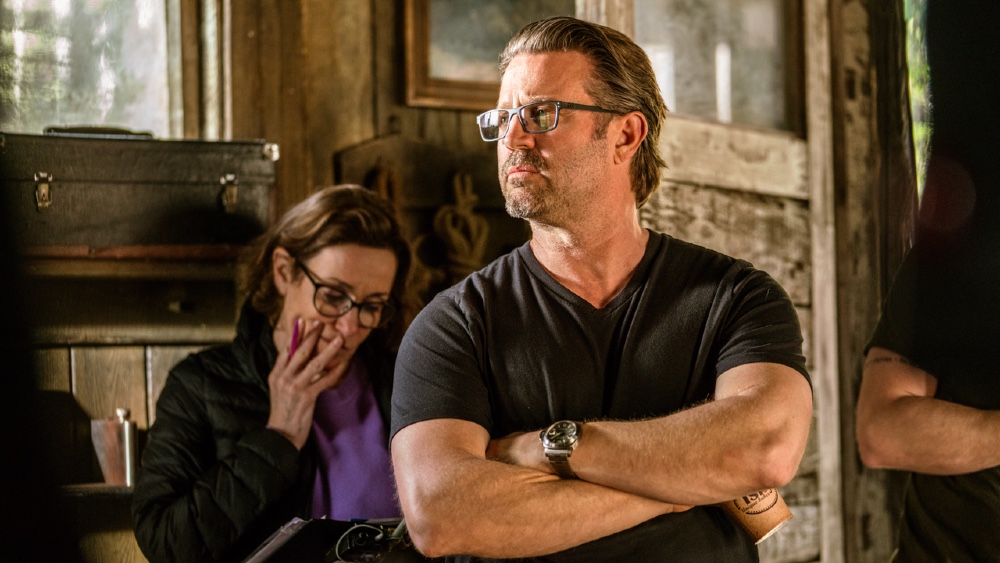
THE BEAT: I spoke to you a little bit about this back when we spoke about Shot Caller. Was Gerard a fan of some of your movies and asked you to direct it? How did it come about?
Waugh: Well, Gerry and I have known each other for a number of years, have been trying to work together. I got this call from him and he said, “Look, I don’t know if you’re interested in franchises, but I’d love for you to come in on the third installment of this Fallen franchise, but to really put your stamp on it.” He pitched me a storyline that I thought was really cool.
The idea was to take the big exciting spectacle and action-packed ride of the first two movies, which were basically event-based movies, right? It was the taking of the White House in Olympus Has Fallen, then it was the assassination of the world leaders in London Has Fallen, but this time not do an event film, actually make the movie about the man, Mike Banning, so that you could actually create an origin story per se in the franchise and still have the big spectacle or the fanbase that loved the first two movies. Give them that, but then also give them the origin story of Mike Banning. For those that hadn’t seen the franchise, it could be a great entry point. You could watch this movie for the first time, not lose a thing, be invested in who these characters are. You could go back and watch Olympus and London, have a great time with them, but you’d actually really understand what made this man tick. It felt like it was exactly the film that I had been looking for, which is to flex my stunt background and bring back the action spectacle that I’m known for in my earlier part of the career and do the dramatic work as well, same time, and give you controversial subject matters and hot topics and complexity of character.
THE BEAT: I realized as I watched this that I hadn’t actually seen London Has Fallen, just the first one. I wasn’t sure if Piper Perabo had played Mike’s wife in that one, but it was a really easy intro to understand what was happening, so was it important to make this work as a standalone as well?
Waugh: Not a standalone. Again, I want it to be an origin story for the people that knew the franchise and then be an entry point. The standalone thing that you’re saying is basically that you can learn about the character either way throughout this journey and realize what Mike Banning is dealing with, what makes him tick, where he comes from, get to meet dad for the first time, and really see the balance of where he’s at in the world today of how a lot of people that do these adrenaline type jobs, law enforcement, military, a professional athlete, we’re all going to face inevitable retirement, but we do everything we possibly can to stay relevant and stay in the game because it’s all we know and it’s what we love.
I thought that was a really interesting view, to show a man that comes from special operations as an Army Ranger go straight into law enforcement, because holding the gun on his hip is the only thing he knows. He’s been a career service member and he’s not ready to give it up; he’s doing everything he possibly can to keep it. I thought that was an interesting play. I love the plot engine that Gerry had come up with, of turning Mike Banning into the fugitive, turning the man who is the number one protector of the most powerful person in the world to suddenly being America’s most wanted.
Then you get to create a road movie out of that and turn him onto offense and have a big section of the movie that Mike Banning for the first time is the rabid dog being hunted. Yeah, I thought that was a really interesting spin on the franchise that could be fresh and entertaining and give us a chance to flex different muscles for Mike Banning, show more complexity of character, have empathy for him, of the things that he’s going through, and then flip him right back onto offense so that the audience is getting their cake and eat it, too. They’re getting to see Mike Banning unleash carnage, a man not afraid of violence because violence is the only thing that he has known, but also show the complexity of character in what he’s dealing with, of trying to balance family and carrying the gun.
THE BEAT: What kind of shape was this in when you came on board? Most of the movies you’ve directed you’ve also written, so did this already have a finished script and was Lionsgate already involved?
Waugh: Basically, when I came aboard, there was a script, but what Gerry and I talked about, there’s no question there was going to be a page one rewrite and that’s what took place. I brought in Matt Cook, who’s a very close friend who wrote Patriot’s Day and been on a number of movies, and really loved what he brought to the table. We teamed up and did a page one rewrite through it. We kept pretty much the same structure of what they had done, turning Mike Banning into America’s most wanted, but wanted to bring a whole new sense of complexity and gravitas and authenticity to, not only the character, but the hot topics and the events that take place in the world and the world views that we’re all facing today with living in a very dangerous place and dangerous time.
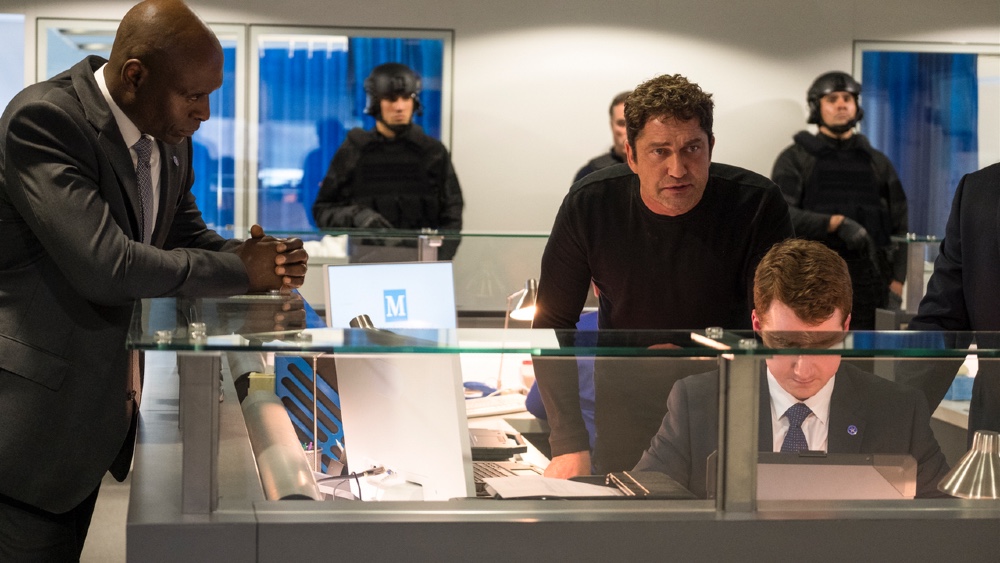
THE BEAT: I definitely saw your imprint on this, being that it was more character-based and better written, I guess.
Waugh: Thanks.
THE BEAT: What about casting Piper Perabo as Mike’s wife? I feel like we haven’t seen her in a while. She hasn’t really been in much.
Waugh: Look, we have a very big cast. We had a very specific window between Morgan Freeman’s schedule, Gerry’s schedule, then we brought Nick Nolte on and Jada Pinkett and Danny Huston. Unfortunately, Radha Mitchell‘s schedule didn’t line up. She was already on something different. It became a point that we were faced to try to cast a new Leah in the movie. I wanted somebody that brought strength, warmth to the character, and also a grounded sense. I’ve always been a fan of Piper, and I liked the work that she’s been doing as of recent. I just felt like she was the right fit, that she represents somebody that we would want to be married to, somebody that we feel like stands up for what she believes in and has a warmth to her and could really play into the hardships of her knowing that her husband is struggling, that he’s trying to figure his way into this part of his journey as a mortal and is trying to support him every way she can, but also show the complexity of her own perils and the own things, her own hardships, and the things that she faces.
THE BEAT: I was surprised to see Danny Hudson taking part in the action, and it looks like he really bulked up and worked out for that role, even in the early scenes where he’s just hanging out with Gerard.
Waugh: Everybody took it seriously. I brought in Tyler Grey, who you know from my documentary, That Which I Love Destroys Me, the Delta Force operator. He went in-depth with both Danny Huston and Gerry and Nick Nolte and talked about what it’s like to be in war and what it is to be in the job and the mentality of it. I think when you start getting that kind of mindset into your head, the physicality comes with it. You start wanting to train. You start wanting to go out to the gun range and do all these things. The actors did all that, but it all started from a place of motive and it all started from a place of character study.
THE BEAT: You come from a stunt background yourself. When you’re planning something like a drone strike, how much of that stuff can you do in-camera? That’s one of the things I liked about this as a counterpart to Hobbs and Shawa few weeks back is that this action feels more grounded where that was very over-the-top.
Waugh: Look, for better or for worse, the type of action that I shoot, I’m always trying to put you in the ride, not witnessing and watching it. I try not to lead the audience in like voyeurs watching something on a screen in front of them, but to immerse them in a way that, whatever I felt when I was doing action myself and stunts, to feel the adrenaline, to feel the danger, to feel the speed, to feel that point of view or be in that point of view that I certainly felt. If you look at the way that Angel Has Fallen is shot, I’m doing as much as I possibly can in-camera to make you feel like you’re in the tack of the drone sequence or the assassination attempt, to make you feel like you’re in the semi chase, not just witnessing it, but you’re actually within the storyline of what it would be like and also the firefights on the end and all the things, all the way to the bitter end of two lions trying to take each other down. It’s always bringing you into the perspective of the players, of the characters, versus watching them like voyeurs.
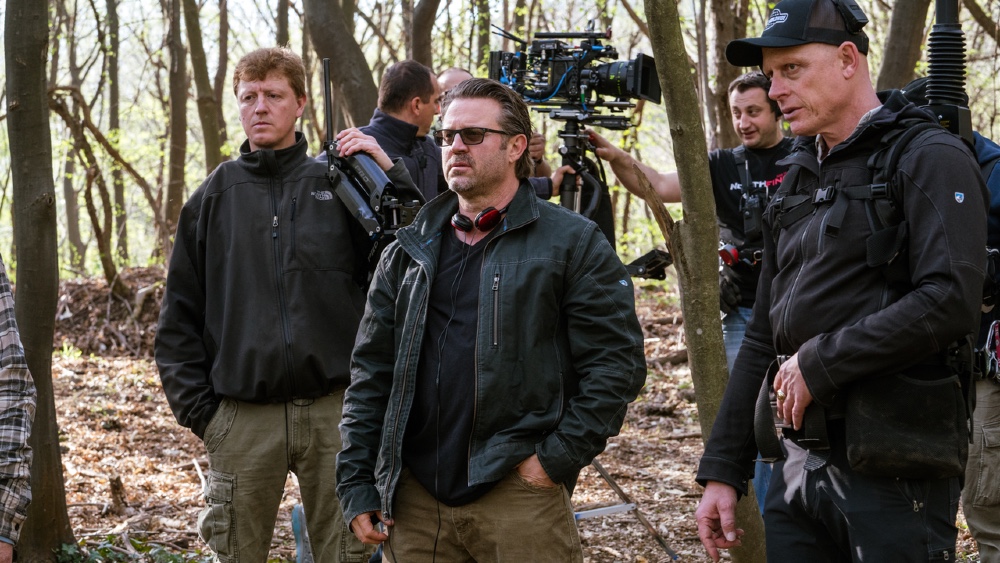
THE BEAT: In this movie, you blow up one building, completely trashed one building. You shot up another. Where do you find locations to do all this stuff? I don’t know where you shot it, but there was some pretty major location damage.
Waugh: We have to hide around the world when we blow this much shit up. We were in three different countries and trying to double-in to places and so forth. Each place, you’re finding what can lend into itself. I mean, when you got a character like Clay Banning [Mike’s father, played by Nick Nolte] that decides to maybe hide a few explosives out in the woods, you try to figure out a place that’s going to help let you blow up an entire mountainside. It’s always finding the locations that feel relevant and feel grounded and a part of the storyline, but also can allow you to do these things. Believe it or not, the drone sequence — and we did blow up an entire amount of ordinance on that lake — that was the Queen’s lake. That was Virginia Water in London, England. We aren’t in the most remote places as you think. I would say maybe I saw the Queen riding her bike around the lake one day, but we definitely blew up a lot of shit, let me tell you that.
THE BEAT: That would’ve been a pretty amazing cameo if you got it, that’s for sure. How are things going with Greenland? How has it been working with Gerard to make that different? Are you using some of the same crew and team on that one, too?
Waugh: No. This was a new team that we got, other than just Gerry and I. Gerry and I really hit it off. You never know if you’re going to have good chemistry that you hope you have when you finally work together. We really hit it off as collaborators, as a filmmaker and a movie star, and just the sensibilities that we share on a creative level about character and story. We were dying to figure out what to do next together. I had read the script Greenland and brought it up. What I loved about Greenland is it was a movie from the inside out. It’s a disaster movie. If Angel Has Fallen is the inside out version of an action movie, where you feel like you’re within the action and the spectacle, Greenland does the same thing of movies like A Quiet Place or World War Z or War of The Worlds, but it’s told from the inside out, where you’re with a family that is in the middle of this whole harrowing journey and really excited to share that with you guys next.
THE BEAT: I was doing research for this and I found your name has been attached to a lot of different things over the years, including Deepwater Horizon, which I guess Peter Berg directed and other things. Do you still have other projects, like either scripts or something that you want to tackle once you finish Greenland
Waugh: Yeah, that’s what I’m trying to figure out next. I’ve been on a fast-pack run here between Shot Caller, Angel Has Fallen, and then now Greenland. I’ll be on Greenland until the end of the year, posting that, so trying to figure out what’s next, but haven’t quite put my finger on it yet. I think there’s definitely some old projects that are out there in the ether that I’m no longer a part of. This is how the business runs, right? It’s trying to get everything, the Rubik’s Cube, to come together, but we’ll see what’s coming next.
THE BEAT: It was great talking to you, and I’m glad to get to talk to you every two years now, rather than every four or five years.
Waugh: Well, let’s make it every year, because I’ll talk to you on Greenland next year, man.
Angel Has Fallen opens on Friday, August 23 with previews on Thursday night.



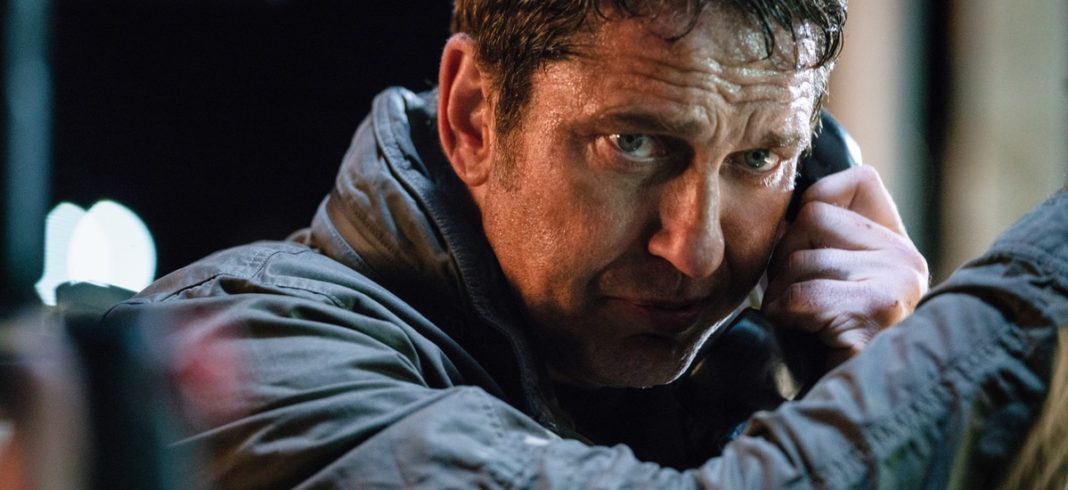

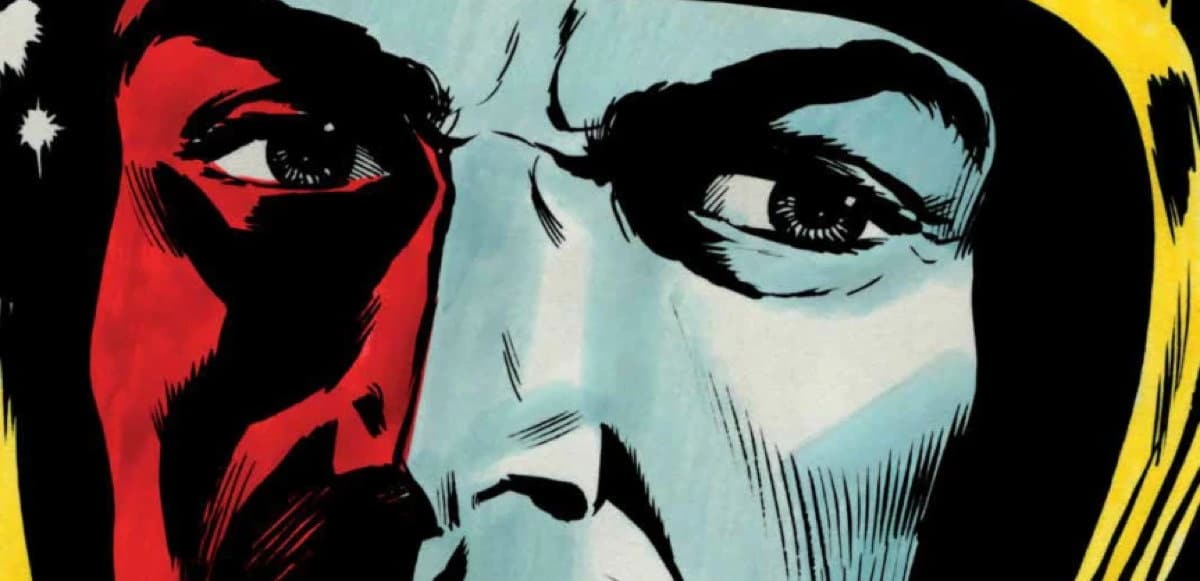
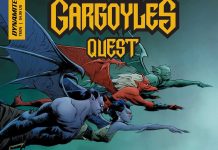






Let me guess: this is a screenwriter so, the hero’s origin is, once again, daddy issues?
Comments are closed.